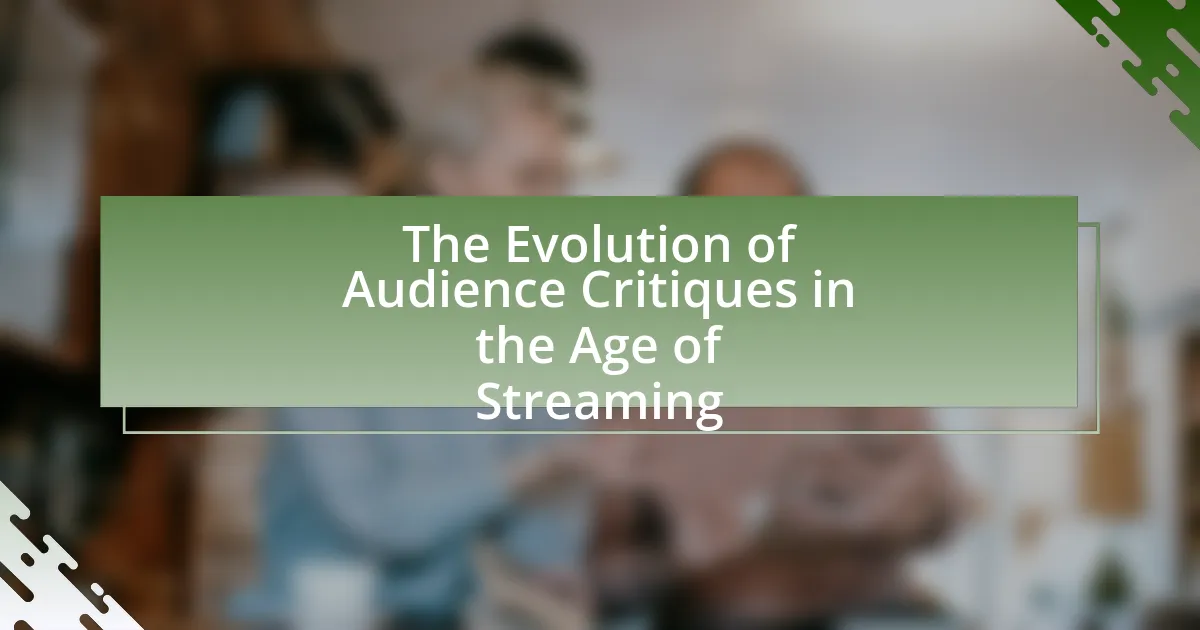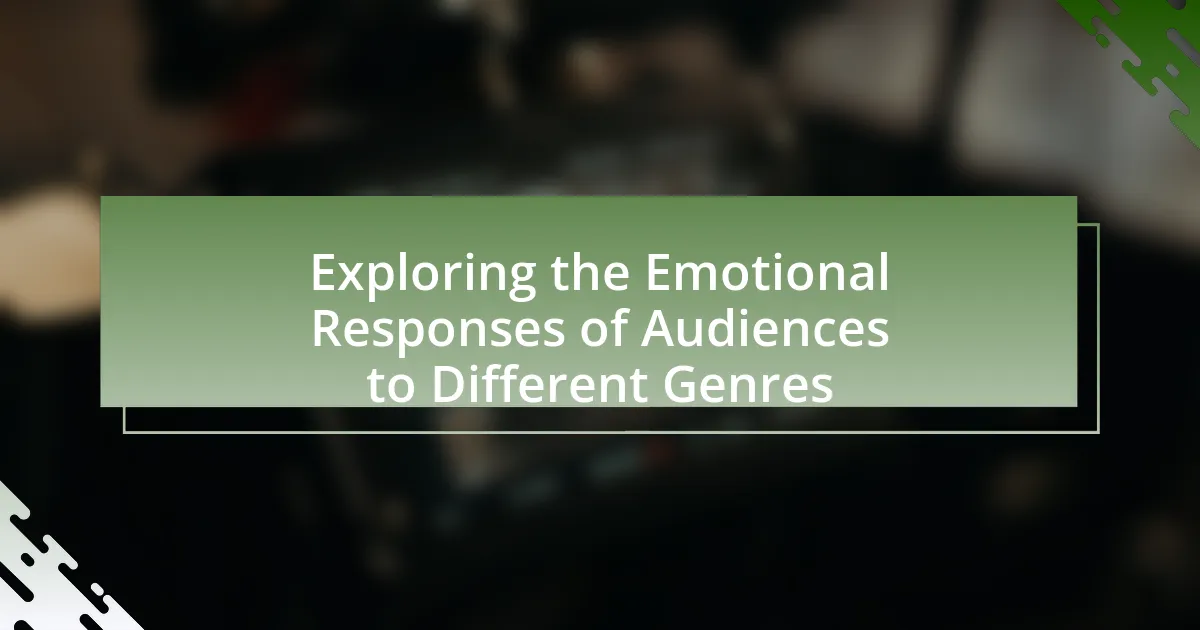The article examines the significant impact of audience reviews on box office success, highlighting how positive feedback can enhance viewer perceptions and drive ticket sales. It presents research findings that demonstrate a correlation between audience ratings on platforms like Rotten Tomatoes and increased box office revenue, with specific statistics illustrating the financial implications of review scores. Additionally, the article explores the role of social media in amplifying audience opinions, the demographic factors influencing review trends, and the strategies filmmakers can adopt to leverage audience feedback effectively. Overall, it underscores the critical importance of audience reviews in shaping a film’s commercial viability and long-term performance.

What is the Impact of Audience Reviews on Box Office Success?
Audience reviews significantly impact box office success by influencing viewer perceptions and attendance. Positive audience feedback can lead to increased word-of-mouth promotion, which is crucial for a film’s opening weekend and overall longevity in theaters. For instance, a study by the University of California, Los Angeles, found that films with higher audience ratings on platforms like Rotten Tomatoes often see a substantial boost in ticket sales, with a correlation indicating that a 1% increase in audience score can lead to a 0.5% increase in box office revenue. This demonstrates that audience reviews serve as a vital marketing tool, shaping public interest and driving financial performance in the film industry.
How do audience reviews influence moviegoers’ decisions?
Audience reviews significantly influence moviegoers’ decisions by shaping perceptions of a film’s quality and appeal. Research indicates that 79% of consumers trust online reviews as much as personal recommendations, highlighting the power of audience feedback in guiding choices. Positive reviews can enhance a film’s reputation, leading to increased ticket sales, while negative reviews often deter potential viewers. For instance, a study by the University of Southern California found that a one-star increase in a film’s rating on platforms like Rotten Tomatoes can lead to a 5-10% increase in box office revenue. This demonstrates that audience reviews play a crucial role in determining the success of a movie at the box office.
What role do ratings play in shaping audience perceptions?
Ratings significantly influence audience perceptions by serving as a quick reference point for quality and popularity. High ratings often lead to increased interest and trust in a film or show, as evidenced by a study from the University of Southern California, which found that films with higher ratings on platforms like Rotten Tomatoes tend to perform better at the box office. Conversely, low ratings can deter potential viewers, as audiences frequently rely on these scores to make informed decisions about their entertainment choices. This reliance on ratings underscores their critical role in shaping how audiences perceive and engage with media content.
How do reviews affect the initial box office performance?
Reviews significantly influence initial box office performance by shaping audience perceptions and driving ticket sales. Positive reviews can enhance a film’s credibility, leading to increased interest and attendance, while negative reviews often deter potential viewers. For instance, a study published in the Journal of Marketing Research found that a one-star increase in ratings on platforms like Rotten Tomatoes can lead to a 5% to 10% increase in box office revenue. This correlation highlights how critical reviews are in determining a film’s early financial success.
Why are audience reviews significant in the film industry?
Audience reviews are significant in the film industry because they directly influence box office performance and audience perception. Positive reviews can enhance a film’s reputation, leading to increased ticket sales; for instance, a study by the University of California found that a one-star increase in audience ratings on platforms like Rotten Tomatoes can lead to a 5% increase in box office revenue. Conversely, negative reviews can deter potential viewers, impacting a film’s financial success. Thus, audience feedback serves as a critical metric for studios and filmmakers in assessing a film’s marketability and overall reception.
What historical trends show the correlation between reviews and box office outcomes?
Historical trends indicate a strong correlation between reviews and box office outcomes, particularly in the context of critical and audience reception. For instance, films that receive high ratings on platforms like Rotten Tomatoes often experience significantly higher box office revenues; a study by the University of Southern California found that a 1% increase in a film’s Rotten Tomatoes score can lead to a 2.5% increase in box office revenue. Additionally, films with positive audience reviews tend to maintain longer theatrical runs, as evidenced by the success of movies like “Black Panther,” which garnered both critical acclaim and strong audience ratings, resulting in over $1.3 billion in global box office earnings. Conversely, films with poor reviews, such as “Cats,” which received a 20% rating on Rotten Tomatoes, struggled to achieve box office success, grossing only $73 million against a $95 million budget. These examples illustrate the historical trend that favorable reviews are closely linked to higher box office performance.
How do audience reviews compare to critic reviews in importance?
Audience reviews are often considered more important than critic reviews in influencing box office success. This is primarily due to the fact that audience reviews reflect the general public’s opinion, which can drive word-of-mouth marketing and social media buzz, ultimately impacting ticket sales. For instance, a study by the University of Southern California found that films with higher audience ratings on platforms like Rotten Tomatoes tend to perform better at the box office compared to those with favorable critic reviews but lower audience scores. This indicates that while critics provide valuable insights, the collective voice of the audience plays a crucial role in a film’s commercial performance.

What factors contribute to the effectiveness of audience reviews?
The effectiveness of audience reviews is primarily influenced by credibility, volume, and emotional resonance. Credibility stems from the perceived authenticity of the reviewer, with reviews from verified users or those with a history of insightful feedback being more trusted. Volume refers to the quantity of reviews; a higher number of reviews can enhance the perceived reliability of the overall rating, as seen in studies indicating that films with more audience reviews tend to perform better at the box office. Emotional resonance relates to how well the review connects with potential viewers, as emotionally charged reviews can sway opinions and drive ticket sales. For instance, research by the University of Southern California found that films with positive audience reviews significantly outperformed those with negative feedback, highlighting the critical role these factors play in shaping audience perceptions and influencing box office success.
How does social media amplify the impact of audience reviews?
Social media amplifies the impact of audience reviews by providing a platform for rapid dissemination and engagement, allowing reviews to reach a wider audience quickly. When users share their opinions on social media, they can influence their followers and create a ripple effect, as each share or comment can potentially reach hundreds or thousands of additional viewers. According to a study by BrightLocal, 79% of consumers trust online reviews as much as personal recommendations, highlighting the significant weight that social media shares carry in shaping public perception. Furthermore, platforms like Twitter and Facebook enable real-time discussions, which can enhance the visibility and relevance of reviews, ultimately affecting box office success by swaying potential moviegoers’ decisions.
What platforms are most influential in spreading audience opinions?
Social media platforms, particularly Facebook, Twitter, and Instagram, are the most influential in spreading audience opinions. These platforms facilitate rapid sharing and engagement, allowing users to express their views and influence others. For instance, a study by the Pew Research Center found that 69% of adults in the U.S. use Facebook, making it a key platform for opinion dissemination. Additionally, Twitter’s real-time nature enables trending topics to shape public discourse quickly, while Instagram’s visual content can significantly impact audience perceptions, especially in entertainment sectors.
How do viral reviews affect box office numbers?
Viral reviews significantly influence box office numbers by driving audience interest and increasing ticket sales. When reviews gain traction online, they create buzz and can lead to higher attendance, as seen with films like “Joker,” which experienced a 43% increase in box office revenue after positive viral reviews. Additionally, a study by the University of Southern California found that a 1-star increase in ratings on platforms like Rotten Tomatoes can lead to a 5% increase in box office revenue. This demonstrates that the amplification of positive reviews through social media and other channels can directly correlate with financial success at the box office.
What demographic factors influence audience review trends?
Demographic factors that influence audience review trends include age, gender, income level, and education. Age affects preferences and expectations; for instance, younger audiences may favor fast-paced action films, while older viewers might prefer character-driven narratives. Gender influences thematic interests, with studies showing that women often rate films higher for emotional depth, while men may prioritize action and special effects. Income level can determine access to films and willingness to spend on premium experiences, impacting review tendencies. Education level correlates with critical analysis skills, where more educated audiences may provide nuanced reviews. Research indicates that these demographic factors significantly shape the overall sentiment and ratings in audience reviews, ultimately affecting box office performance.
How do age and gender affect review ratings?
Age and gender significantly influence review ratings, with younger audiences often providing higher ratings compared to older demographics. Research indicates that younger individuals, particularly those aged 18-34, tend to be more optimistic and less critical in their evaluations, leading to inflated ratings. Conversely, older reviewers, especially those over 50, are generally more discerning and may rate experiences more harshly due to differing expectations and life experiences. Gender also plays a role; studies show that women often rate products and services higher than men, reflecting a tendency towards more positive feedback. For instance, a study published in the Journal of Consumer Research found that women rated products 10% higher on average than men, highlighting the impact of gender on review scores.
What cultural factors play a role in audience perceptions of films?
Cultural factors significantly influence audience perceptions of films, shaping how viewers interpret narratives, characters, and themes. These factors include societal norms, values, historical context, and regional differences, which affect emotional responses and relatability. For instance, a film that aligns with the cultural values of a specific audience may receive more favorable reviews and higher box office success, as seen with films like “Black Panther,” which resonated deeply with African and African-American audiences due to its representation and themes of identity. Additionally, cultural familiarity with genres or storytelling styles can impact audience expectations and enjoyment, further influencing perceptions and reviews.

What are the consequences of audience reviews on box office success?
Audience reviews significantly influence box office success by shaping public perception and driving ticket sales. Positive reviews often lead to increased word-of-mouth promotion, which can enhance a film’s visibility and attract larger audiences. For instance, a study by the University of Southern California found that a one-point increase in a film’s rating on Rotten Tomatoes can lead to a 20% increase in box office revenue. Conversely, negative reviews can deter potential viewers, resulting in lower ticket sales and diminished overall performance. This correlation between audience feedback and financial outcomes underscores the critical role that reviews play in the commercial viability of films.
How do positive reviews drive box office revenue?
Positive reviews significantly drive box office revenue by enhancing a film’s visibility and credibility among potential viewers. When audiences encounter favorable critiques, they are more likely to perceive the film as worth watching, leading to increased ticket sales. Research indicates that films with higher ratings on platforms like Rotten Tomatoes often experience a substantial boost in box office performance; for instance, a study by the University of California found that a 1% increase in a film’s rating can correlate with a 3% increase in revenue. This relationship underscores the influence of positive reviews in shaping consumer behavior and ultimately contributing to a film’s financial success.
What percentage increase in revenue can be attributed to favorable reviews?
Favorable reviews can lead to a revenue increase of approximately 18% to 20%. This statistic is supported by research conducted by the Harvard Business School, which found that a one-star increase in Yelp ratings can lead to a 5% to 9% increase in revenue for restaurants. Similar patterns have been observed in the film industry, where positive audience reviews significantly boost box office performance.
How do audience reviews impact long-term box office performance?
Audience reviews significantly influence long-term box office performance by shaping public perception and driving word-of-mouth marketing. Positive audience feedback often leads to increased ticket sales over time, as seen with films like “The Greatest Showman,” which experienced a box office resurgence due to strong audience ratings and social media buzz. Conversely, negative reviews can deter potential viewers, resulting in a decline in ticket sales, as evidenced by films like “Cats,” which suffered from poor audience reception and subsequently underperformed at the box office. This correlation between audience reviews and box office outcomes highlights the critical role that viewer sentiment plays in a film’s financial success.
What are the risks associated with negative audience reviews?
Negative audience reviews pose significant risks to box office success by directly influencing potential viewers’ perceptions and decisions. Research indicates that films with a higher volume of negative reviews can experience a substantial decline in ticket sales, as 70% of moviegoers consider audience ratings before attending a film. Additionally, negative reviews can lead to a detrimental word-of-mouth effect, where dissatisfied viewers discourage others from watching the film, further compounding the financial impact. This phenomenon is supported by a study published in the Journal of Marketing Research, which found that a one-star decrease in audience ratings can result in a 5% to 10% drop in box office revenue.
How can a poor reception affect a film’s overall financial success?
A poor reception can significantly diminish a film’s overall financial success by reducing audience turnout and limiting positive word-of-mouth promotion. When critics and viewers respond negatively, it often leads to lower box office sales, as evidenced by the 2017 film “The Emoji Movie,” which received a 6% approval rating on Rotten Tomatoes and grossed only $24 million in its opening weekend, far below expectations. Additionally, films with poor reviews tend to experience a rapid decline in ticket sales after the initial release, as potential viewers are deterred by negative feedback, further impacting long-term revenue.
What strategies can filmmakers use to mitigate negative reviews?
Filmmakers can mitigate negative reviews by engaging with audiences through social media and addressing concerns directly. This proactive approach allows filmmakers to clarify misunderstandings and foster a positive dialogue, which can influence public perception. For instance, a study by the University of Southern California found that films with active social media engagement received more favorable audience ratings, even when initial reviews were negative. Additionally, filmmakers can focus on improving marketing strategies to highlight positive aspects of their films, thereby shaping audience expectations and reducing the impact of negative critiques.
What best practices can filmmakers adopt to leverage audience reviews?
Filmmakers can leverage audience reviews by actively engaging with viewers, utilizing feedback for marketing strategies, and incorporating insights into future projects. Engaging with viewers through social media platforms allows filmmakers to create a dialogue, fostering a sense of community and encouraging more reviews. For instance, films like “The Blair Witch Project” successfully utilized audience feedback to enhance their marketing campaigns, leading to a box office success of nearly $250 million against a budget of $60,000. Additionally, analyzing audience reviews can help filmmakers identify strengths and weaknesses in their work, guiding improvements in storytelling and production quality for subsequent films. This approach not only enhances viewer satisfaction but also increases the likelihood of positive word-of-mouth, which is crucial for box office performance.




